Overview
This article identifies eight key factors that significantly influence water truck rental costs. These factors include:
- Truck capacity
- Rental duration
- Geographical location
- Seasonal demand
- Reputation of rental companies
Each factor impacts pricing in unique ways, making strategic planning and a thorough understanding of local market conditions essential for optimizing rental expenses. For instance, short-term rentals tend to be more expensive than long-term options, and urban demand can inflate costs by as much as 20%. Understanding these dynamics is crucial for making informed rental decisions.
Key Highlights:
- Assess specific liquid transport needs by evaluating volume, frequency of use, and terrain conditions.
- Water truck capacities typically range from 2,000 to 5,000 gallons, with larger trucks preferred for construction projects.
- Short-term rentals are more expensive (around $300/day) compared to long-term rentals (as low as $150/day), emphasising the need for strategic planning.
- Urban areas often have higher rental costs (up to 20% more) due to increased demand and competition.
- Seasonal demand affects pricing, with costs rising by up to 20% during peak times; early reservations can yield discounts of 15%.
- Reputable rental companies, like EZ Equipment Rental, are crucial for ensuring quality service and equipment reliability.
- Consider additional services such as delivery and maintenance, which can enhance efficiency and reduce downtime.
- Understand insurance and liability coverage options to protect against unforeseen expenses during the leasing period.
- Explore discounts and promotions offered by rental companies to optimise savings on rental costs.
Introduction
Understanding the intricacies of water truck rental costs is essential for project managers in construction, landscaping, and other industries that require liquid transport. Numerous factors influence these costs—from project specifications and rental durations to geographical location and seasonal demand. Navigating this rental landscape can appear daunting.
How can one ensure they are making the most cost-effective decision while satisfying operational needs? This article explores the key elements that impact water truck rental costs, offering insights that empower readers to optimize their choices and budgets effectively.
Project Requirements: Define Your Water Truck Needs
Evaluating your initiative's specific liquid transport requirements, such as the water truck rental cost, is essential for ensuring efficiency and cost-effectiveness. Start by assessing the volume of liquid needed, the frequency of use, and the terrain conditions. For instance, construction sites often necessitate larger capacity trucks—typically ranging from 2,000 to 4,000 gallons or more—for effective dust control and concrete mixing. In contrast, landscaping projects may only require smaller trucks for irrigation purposes.
To accurately determine your requirements, consider the following:
- Volume of Water: Calculate the total water needed based on the area size and specific tasks at hand.
- Frequency of Use: Assess how often water will be required throughout the project duration. Short-term rentals may suffice for occasional needs, while long-term rentals are preferable for ongoing requirements.
- Terrain Conditions: Evaluate the site's accessibility and the type of vehicle that can maneuver efficiently. Sturdy vehicles are especially preferred for their longevity and minimal upkeep expenses, with demand increasing at a CAGR of 3.6% throughout the projected period, indicating a promising trend for this category of vehicle.
Statements from seasoned construction supervisors underscore the importance of this evaluation: "As construction and mining operations rise, the need for transport vehicles also grows, thus propelling the rental market for these vehicles." By clearly defining these needs, you can select the most suitable vehicle for liquid transport, taking into account the water truck rental cost to ensure that your project operates efficiently and remains within budget.
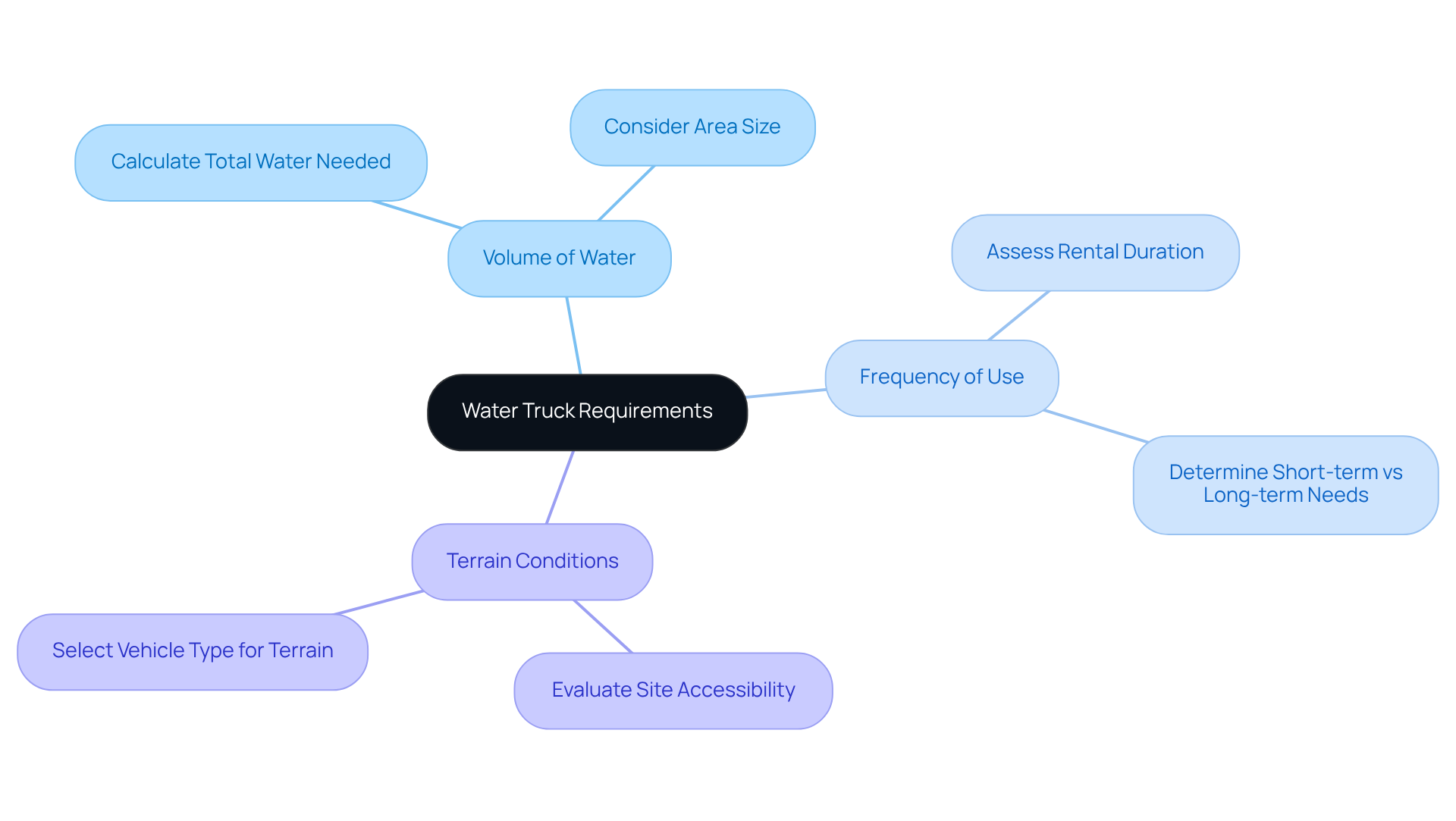
Truck Specifications: Choose the Right Capacity and Features
When selecting a tanker, it is essential to consider its capacity, which typically ranges from 2,000 to 5,000 gallons. For instance, the Load King 2,000-gallon vehicle measures 98" long x 98" wide x 64.75" tall, whereas the Load King 4,000-gallon vehicle measures 198" long x 96" wide x 64.75" tall. The pump capacity is particularly important; a vehicle with a higher pump capacity can deliver liquid more quickly, significantly benefiting large-scale projects.
Furthermore, evaluating features such as advanced spray systems and maneuverability is crucial. Trucks equipped with air-controlled spray heads and elliptical tanks reduce water surges, thereby enhancing stability during transport. As Chip Howard, Product Manager at Custom One Source, states, "Water vehicles with elliptical tanks experience significantly fewer surges than rectangular ones would."
Ensuring that the specifications of the vehicle align with your initiative's requirements will optimize operational efficiency and effectiveness. Additionally, it is vital to consider potential extra costs associated with leasing a tanker, including refundable deposits and hidden charges, to ensure accurate budgeting for your project, especially the water truck rental cost.
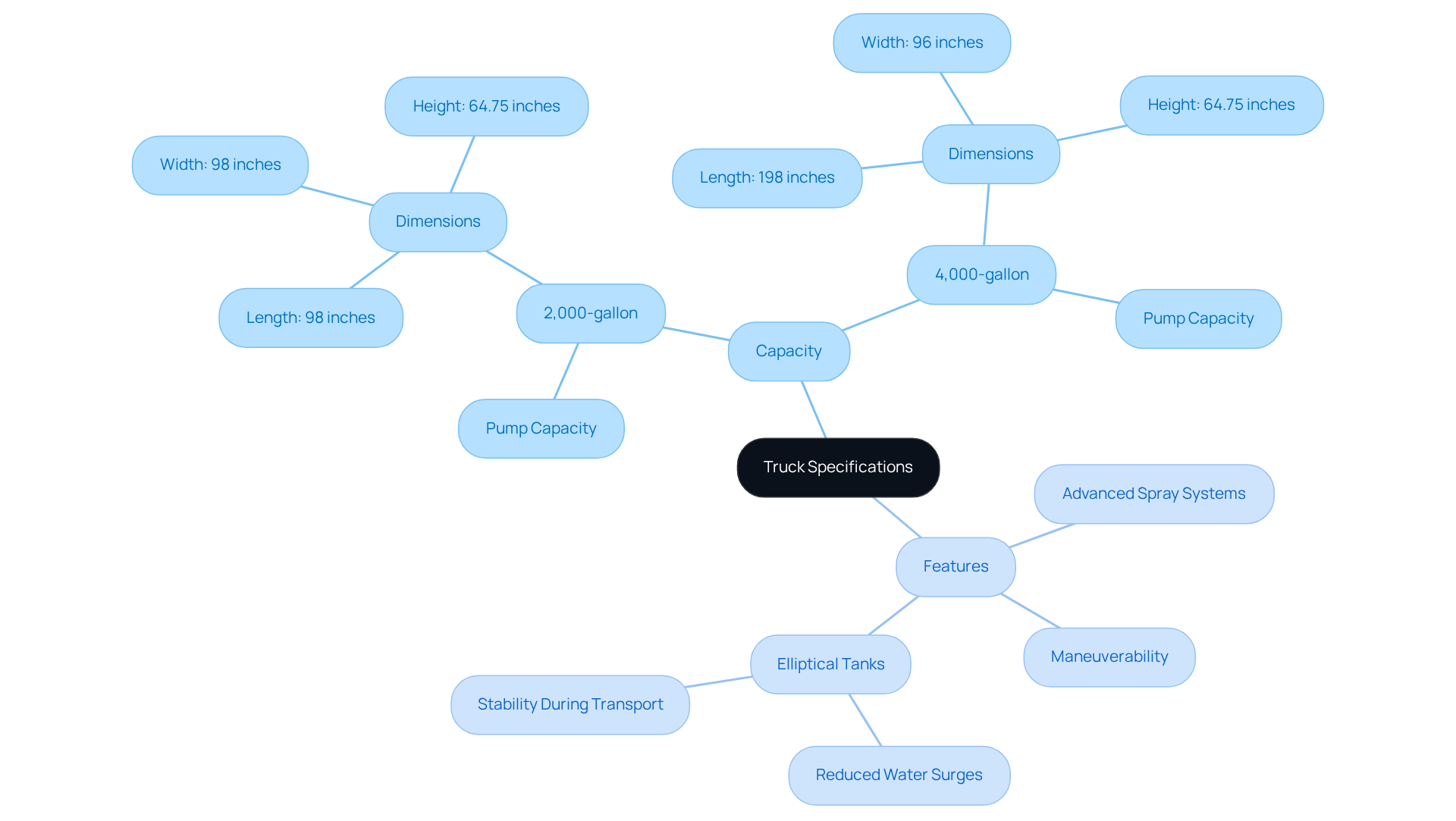
Rental Duration: Understand Pricing Structures for Short vs. Long-Term Rentals
The water truck rental cost can vary significantly based on the length of the lease agreement. Short-term accommodations, typically defined as those lasting under a month, often come with elevated daily rates, making them less cost-effective for long-term projects. For example, a short-term lease may cost around $300 per day, whereas a long-term arrangement can decrease to as low as $150 per day, leading to substantial savings over time.
When planning a project that spans several weeks or months, opting for a weekly or monthly lease can yield considerable savings. Clients who reserve tankers for extended periods can save an average of 15% compared to peak time leases, underscoring the financial benefits of early planning. Furthermore, larger water trucks, such as those with a 6,000-gallon capacity, can be more economical for large-scale projects due to fewer refill trips, thereby enhancing budget efficiency.
It is crucial to discuss your project timeline with the leasing company to identify the most cost-effective options available. Many leasing companies provide loyalty programs that can offer discounts averaging 10-20% based on leasing frequency and duration, further boosting overall savings. Additionally, verifying hidden fees and extra charges when assessing leasing companies is essential, as these can significantly impact the total cost. By understanding the water truck rental cost differences between short-term and long-term leases, along with the effects of seasonal demand on pricing, businesses can make informed financial decisions that align with their project requirements.
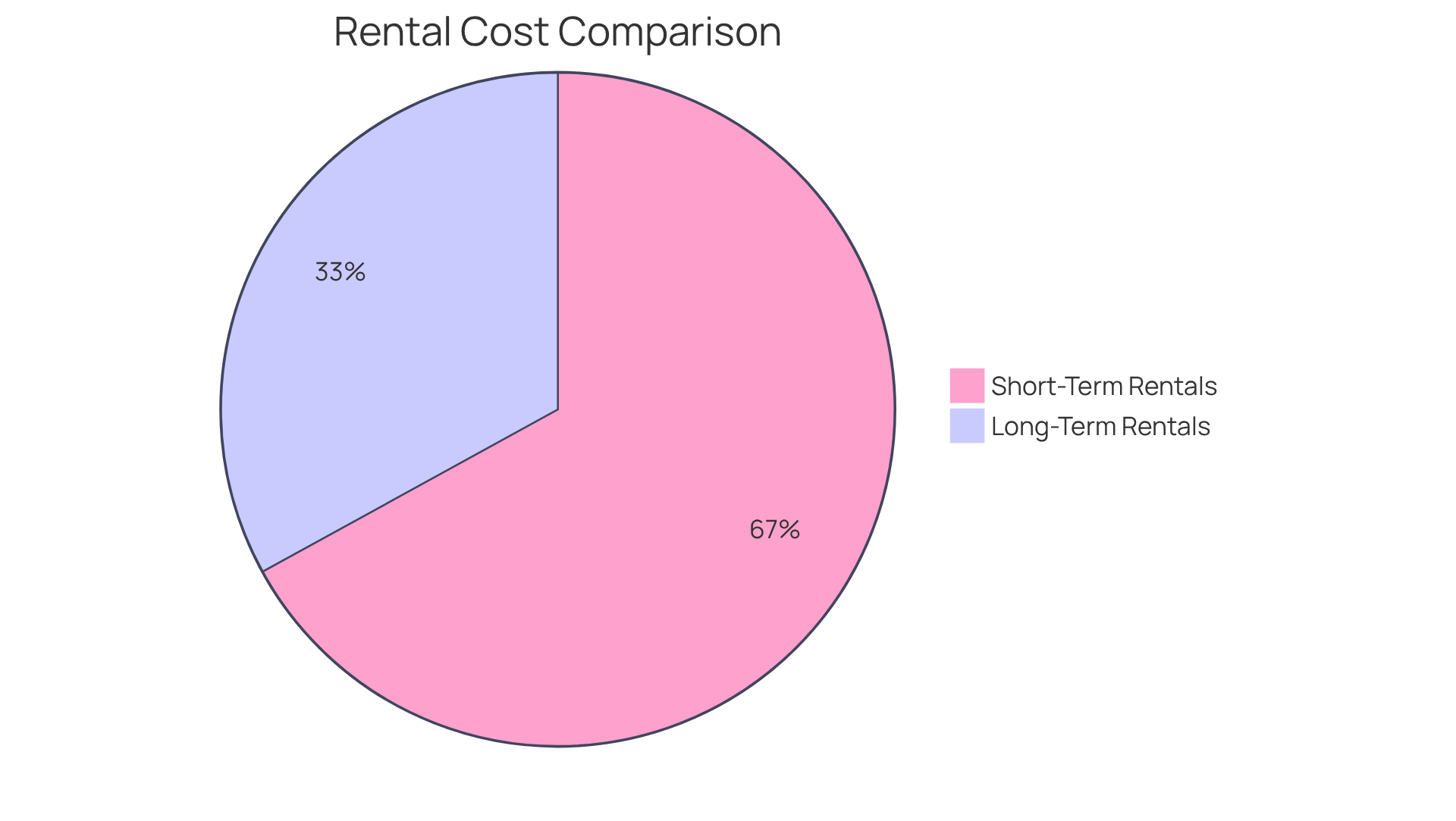
Geographical Location: Assess Local Market Conditions
The geographical location significantly influences the water truck rental cost. Urban regions frequently encounter increased demand, resulting in higher water truck rental costs compared to their rural equivalents. For example, competition among leasing firms in highly populated areas can drive prices up, while rural zones may benefit from lower rates due to diminished demand.
Furthermore, the water truck rental cost may include additional services such as delivery and insurance, which can further increase overall expenses. Understanding these local market dynamics is crucial for project managers seeking cost-effective solutions. By investigating different leasing options and comparing the water truck rental cost, significant savings can be achieved.
Statistics indicate that urban lease prices can be up to 20% greater than those in rural areas, which is similar to how water truck rental costs vary by location, underscoring the importance of location in leasing decisions. Clients involved in loyalty programs often enjoy discounts averaging 10-20% on the water truck rental cost, presenting further opportunities for savings.
By evaluating local market conditions, including the presence of competing leasing services and discussing project requirements with service providers, clients can make informed decisions that align with their budgetary constraints. When budgeting for water truck rental cost, it is also essential to consider common hidden charges, such as mileage overage fees and late return penalties.
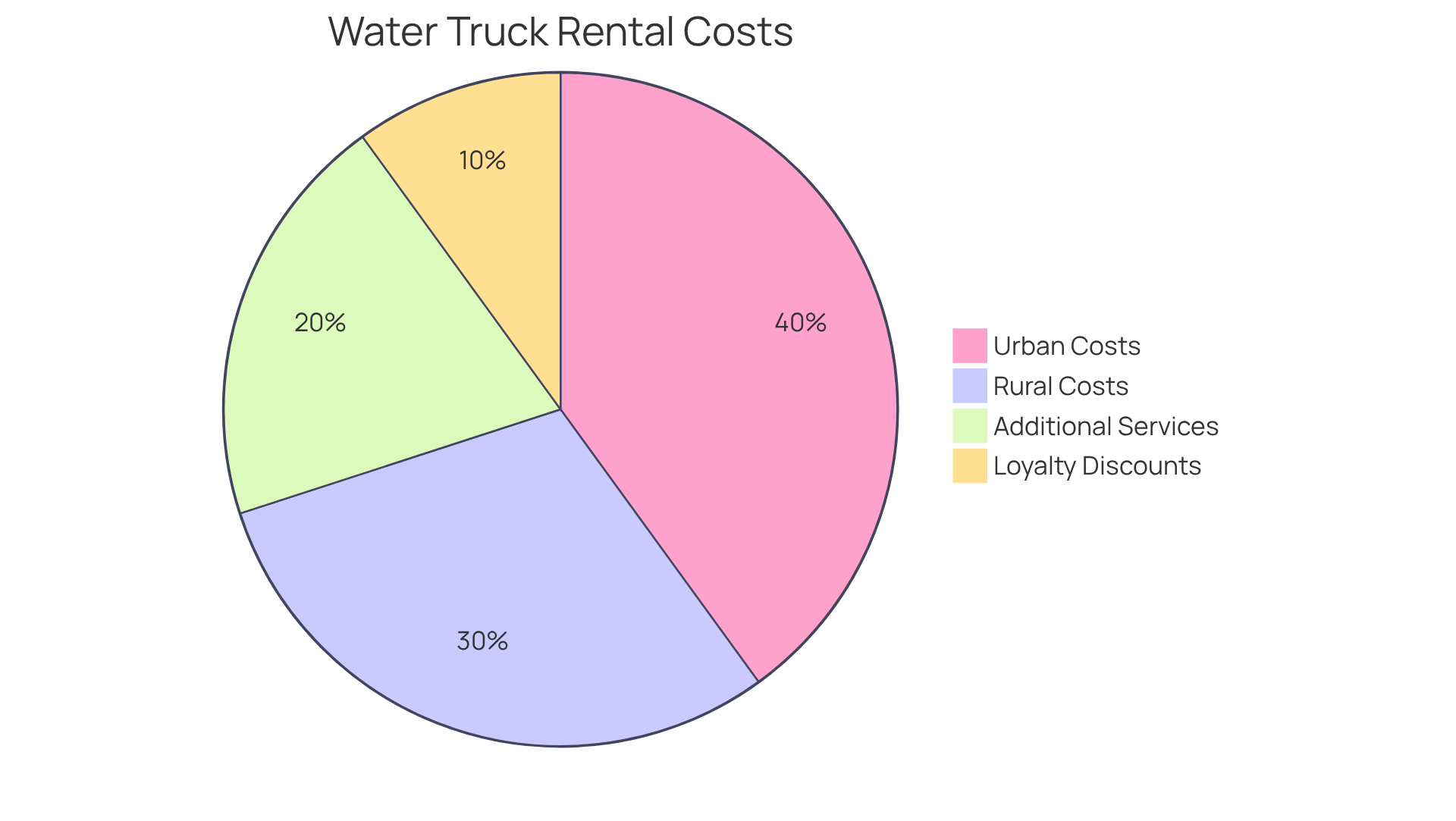
Seasonal Demand: Plan for Peak and Off-Peak Pricing
Seasonal demand plays a crucial role in influencing water truck rental cost. During peak construction seasons and drought conditions, the water truck rental cost typically surges due to heightened demand, with average prices escalating by as much as 20% during these busy periods. This reality underscores the necessity for project managers to plan ahead effectively. Conversely, off-peak periods present opportunities for significant savings; customers who reserve accommodations three months in advance can enjoy an average discount of 15% compared to last-minute bookings. Observing local seasonal patterns can greatly assist in making informed leasing choices.
Moreover, geographical variations in pricing warrant consideration, as urban areas often experience higher costs driven by increased demand and operational expenses. Construction professionals consistently emphasize the importance of strategic planning, noting that early reservations can effectively mitigate the impact of seasonal price hikes. Furthermore, it is essential to recognize that insurance premiums for liquid hauling operations have surged by 14% annually in Texas, which can also influence overall leasing costs. By understanding these dynamics, project managers can optimize their budgets and ensure they secure the necessary equipment at competitive rates.
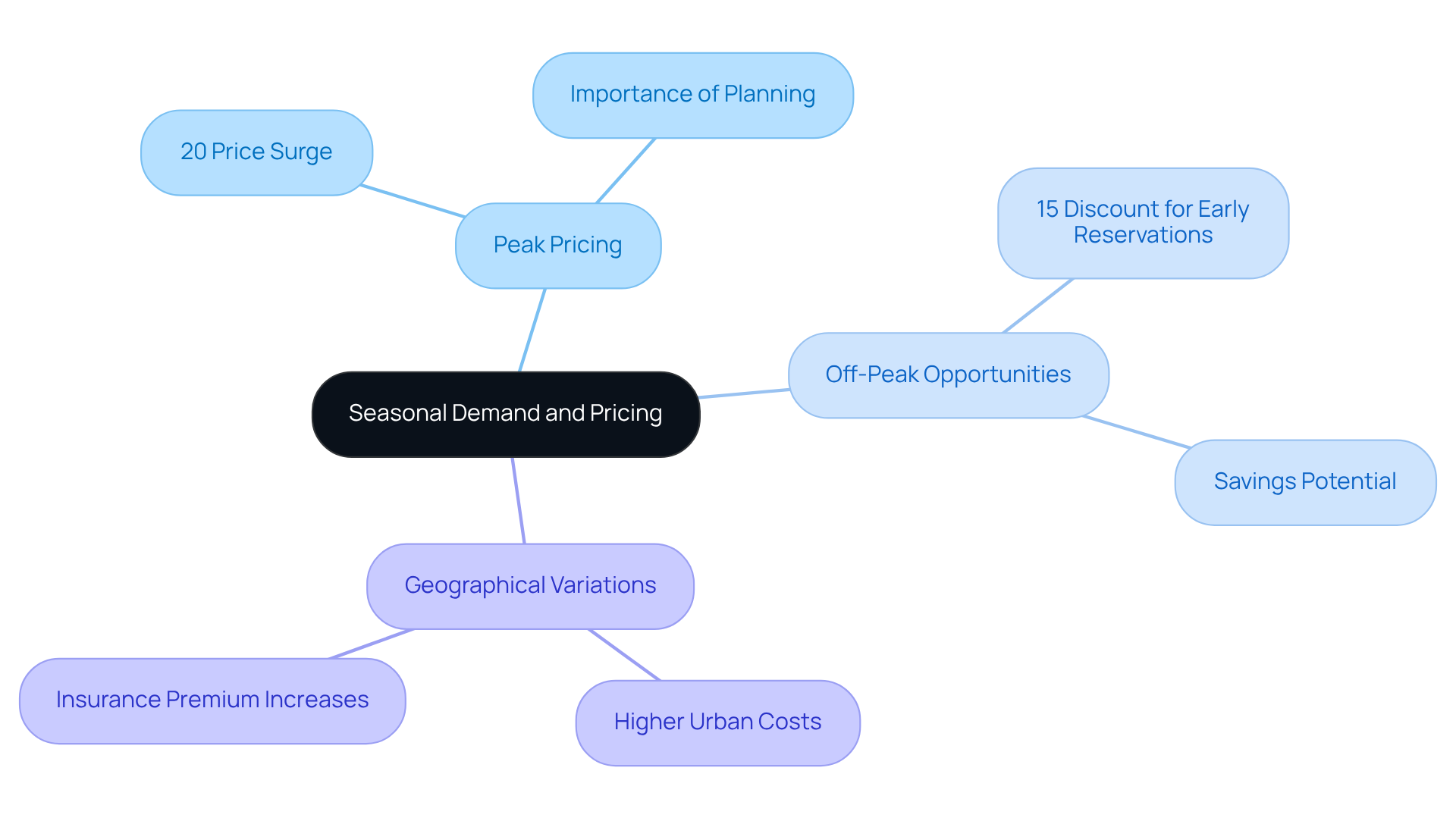
Rental Company Reputation: Choose Quality Service Providers
Choosing a reputable leasing company is crucial for guaranteeing quality service and dependable equipment. EZ Equipment Rental in Dallas, Texas, stands out for several compelling reasons. Their unwavering commitment to excellent customer service, timely delivery, and well-maintained equipment has garnered numerous positive testimonials from satisfied clients. Investigating customer feedback offers valuable insight into the company's reputation. By selecting a business like EZ Equipment Rental, recognized for prioritizing customer satisfaction and possessing a proven track record in the industry, you can significantly enhance your leasing experience.
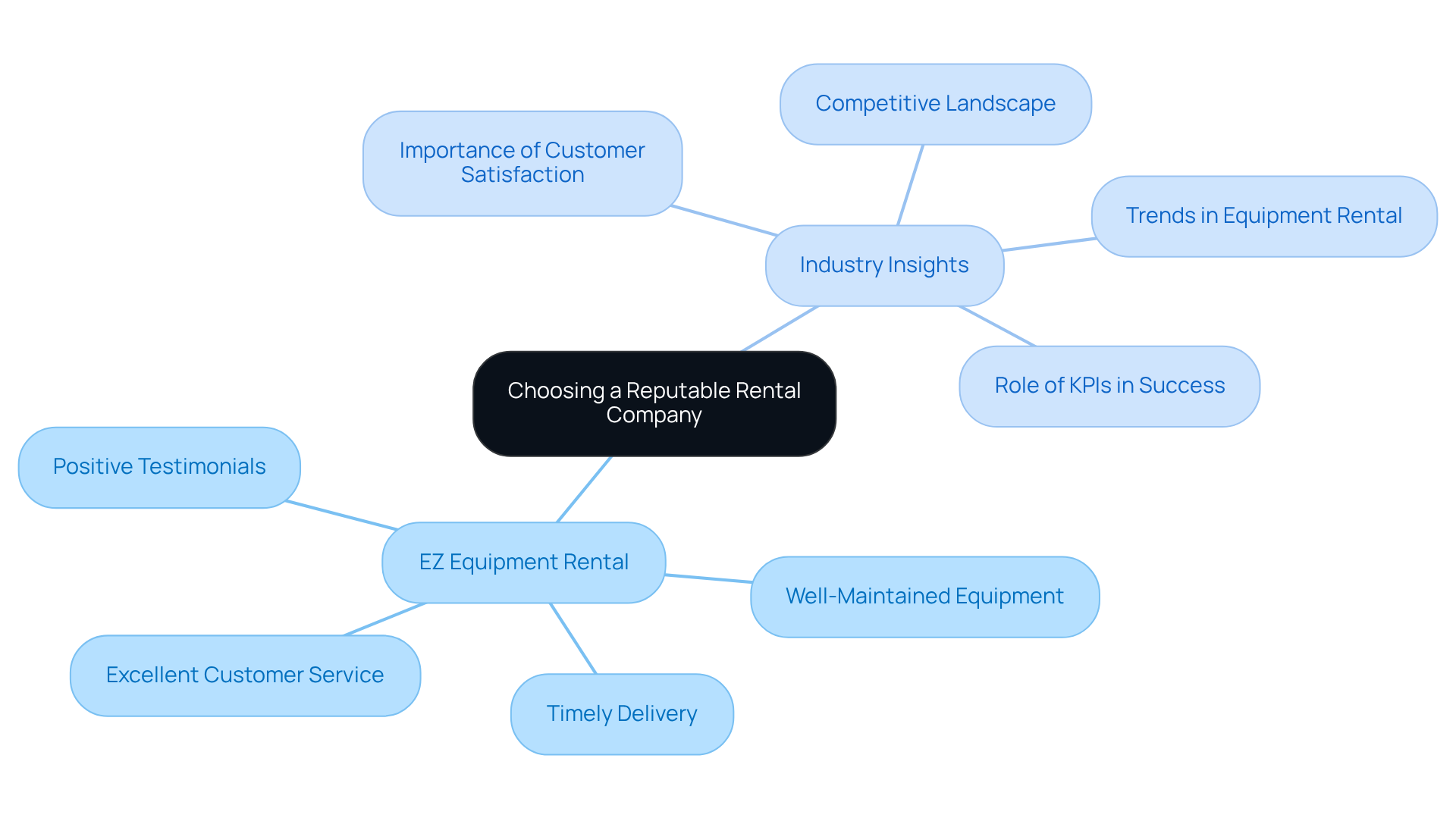
Additional Services: Evaluate Delivery and Maintenance Options
When hiring a water truck, evaluating the additional services provided by the company is essential, particularly delivery, setup, and maintenance. These services significantly enhance efficiency and reduce downtime. For instance, on-site assistance during the leasing period ensures that the equipment operates seamlessly, allowing managers to focus on their primary responsibilities without worrying about equipment issues.
Delivery options can also impact the water truck rental cost, as some firms may charge extra for transportation, while others include it within the usage fee. Understanding the water truck rental cost in advance aids in effective budgeting. Furthermore, maintenance services are critical in preventing unexpected breakdowns, especially during peak operational periods.
Companies that offer regular maintenance checks effectively mitigate risks associated with equipment failure, ultimately saving time and money. Discussing these options with your rental provider can reveal potential savings and efficiencies tailored to your specific needs.
Industry insights suggest that utilizing delivery and maintenance services leads to a more streamlined operation, enhancing overall outcomes. By prioritizing these options, project managers can ensure informed decisions that align with their operational goals.
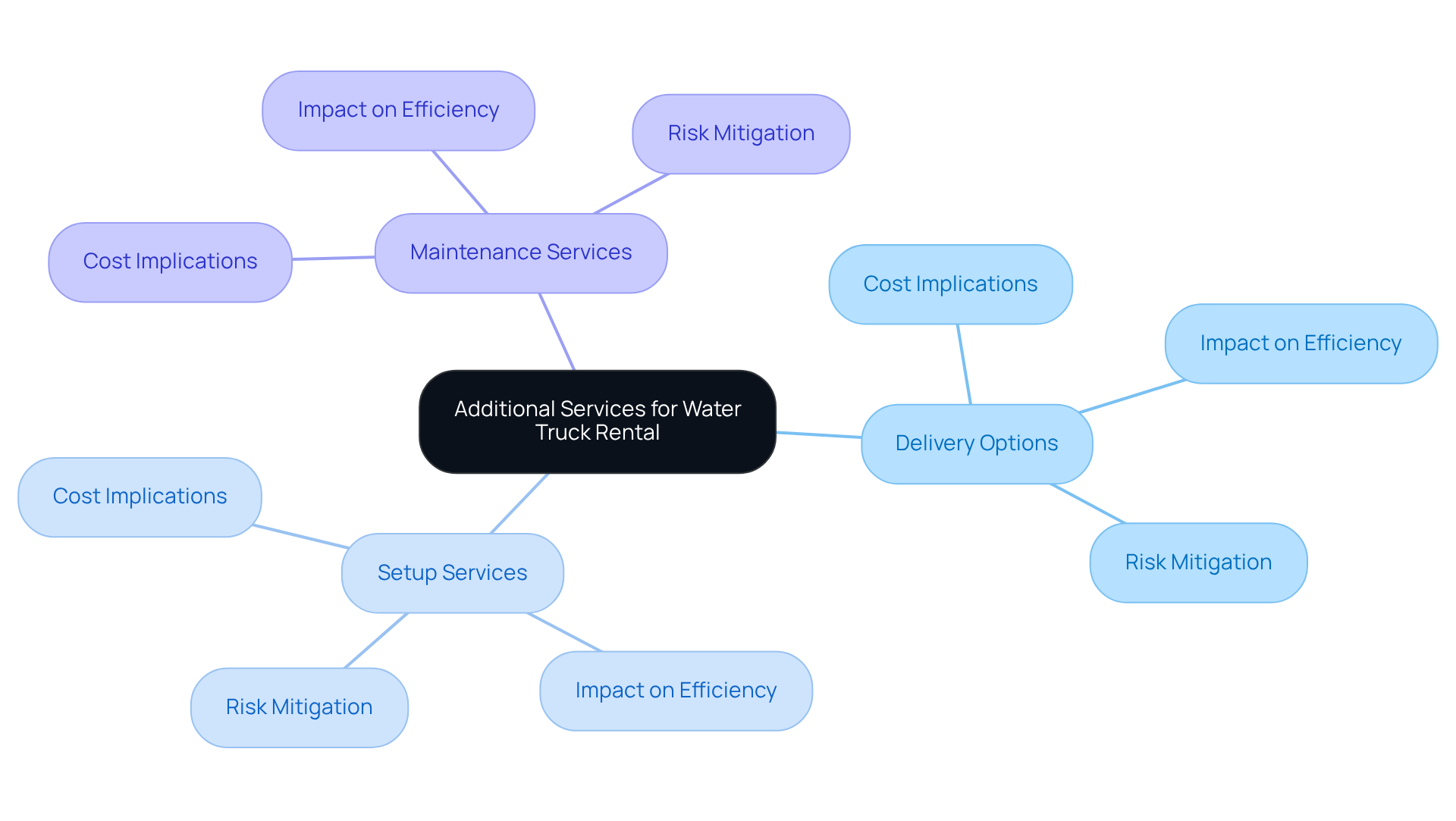
Insurance and Liability: Understand Coverage Options
Before confirming your lease, it is essential to understand the insurance and liability options available. Numerous leasing companies provide insurance protection for their equipment; however, you may also need to secure your own liability insurance. Understanding the terms of coverage is crucial, including what is included and any potential exclusions. For example, equipment leasing insurance typically covers damages from theft, accidents, and natural disasters, but may not cover rust, corrosion, or normal wear and tear. Monthly payments for equipment insurance can range from $19 to $99, depending on the coverage limits and the type of equipment leased.
General liability insurance plays a vital role in covering damage costs caused by leased equipment and legal fees from lawsuits, making it essential to comprehend the implications of liability coverage. Having the appropriate insurance in place protects you from unforeseen expenses related to damage or incidents during the leasing period. This ensures that you can focus on your project without monetary worries. Always clarify your responsibilities and the coverage details with your leasing provider to avoid any surprises, as this proactive approach will safeguard your interests.
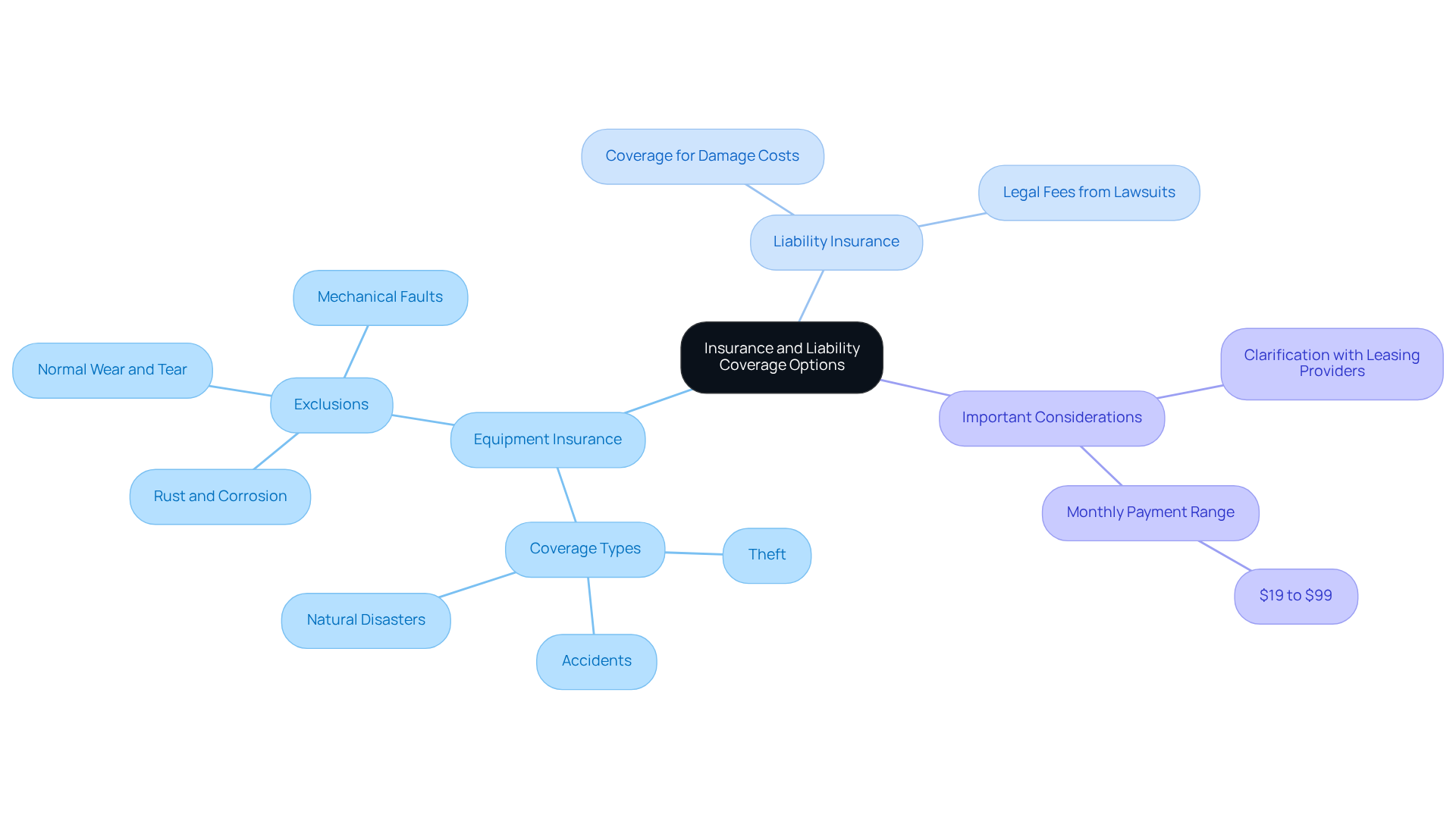
Discounts and Promotions: Explore Cost-Saving Opportunities
Rental companies frequently offer a variety of discounts and promotions that can significantly reduce the water truck rental cost. It is essential to inquire about available offers, such as:
- Discounts for long-term leases
- Seasonal promotions
- Loyalty programs
While also considering the water truck rental cost for repeat clients. Engaging with these opportunities can lead to substantial savings, enhancing the affordability of your water truck rental cost. For instance, implementing a tiered pricing structure, where the daily rate decreases after the second day, can motivate extended usage, optimizing both savings and equipment utilization. Always remember to ask about potential discounts when discussing leasing options to ensure you secure the best water truck rental cost possible.
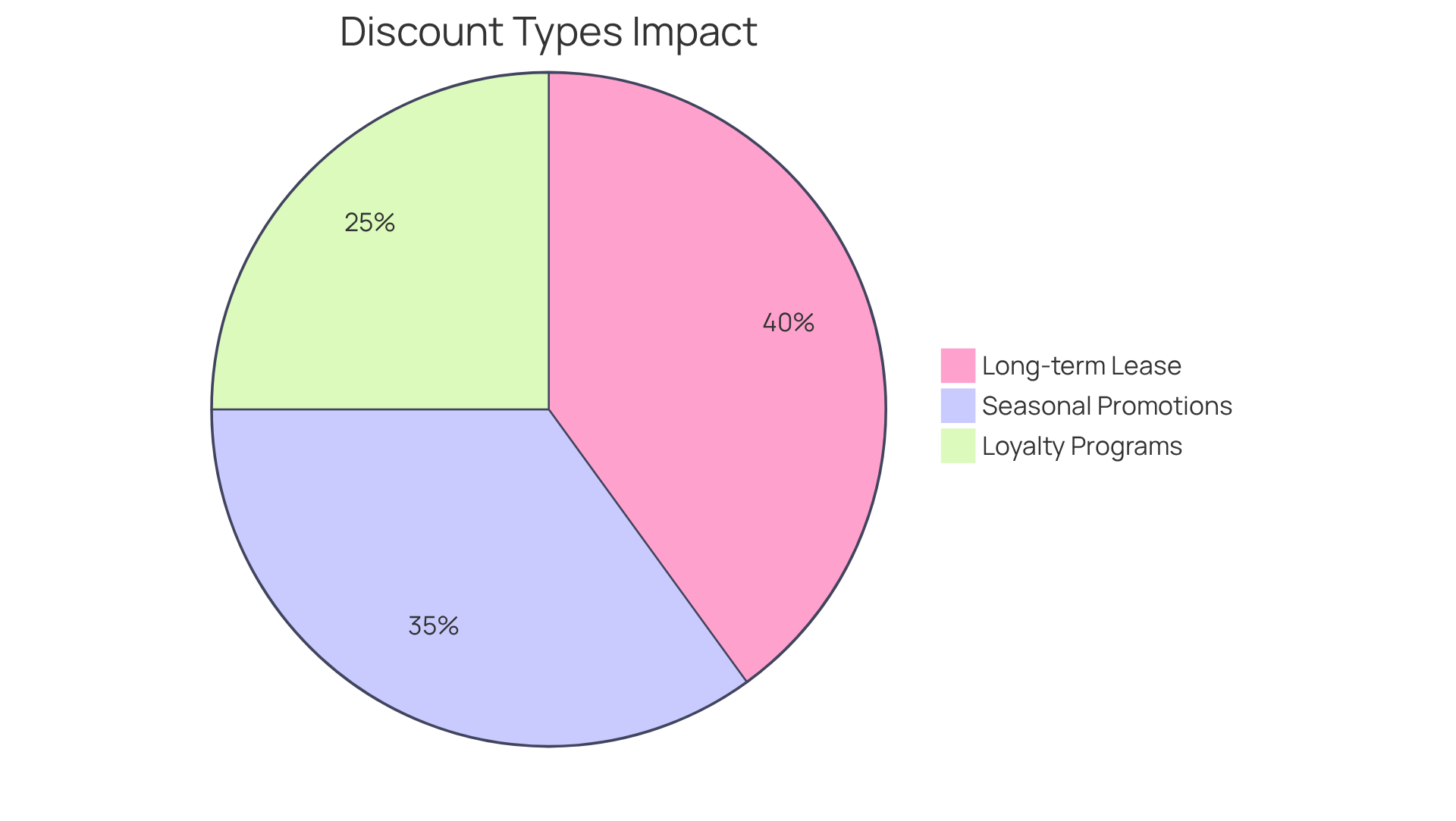
EZ Equipment Rental: Your Premier Choice for Water Truck Rentals in Dallas-Fort Worth
EZ Equipment Rental stands as the premier provider of liquid transport rentals in the Dallas-Fort Worth region, recognized for its unwavering commitment to quality and customer satisfaction. Their extensive fleet features 4000-gallon vehicles, essential for a range of construction applications, including:
- Dust control
- Soil compaction
- Fire prevention
- Site cleanup
Clients consistently report high satisfaction levels, with many praising the reliability and efficiency of the vehicles. One customer noted, 'The vehicle from EZ Equipment Rental was in excellent working order and facilitated our project effectively.' With a knowledgeable team ready to assist in selecting the right equipment, EZ Equipment Rental ensures a seamless leasing experience.
Moreover, their competitive pricing and flexible rental terms further enhance their attractiveness, establishing them as the preferred choice for contractors in need of dependable solutions that consider the water truck rental cost. Experience the difference with EZ Equipment Rental and discover why they are highly regarded by customers throughout the DFW Metroplex. Contact us today to learn more about how we can support your next project.
Conclusion
Understanding the intricacies of water truck rental costs is vital for making informed decisions that align with project needs and budget constraints. By evaluating the specific requirements of your project, selecting the appropriate truck specifications, and considering factors such as rental duration, geographical location, and seasonal demand, significant savings can be achieved. Furthermore, choosing a reputable rental company and exploring additional services, insurance options, and available discounts enhances the overall experience and efficiency of the rental process.
Key insights from this article emphasize the importance of thorough planning and assessment. Determining the right capacity and features of the water truck is essential, as local market conditions and seasonal demand directly affect pricing. Each of these factors plays a critical role in optimizing costs. Additionally, leveraging loyalty programs and promotions can lead to further financial benefits, making it essential to inquire about these opportunities when negotiating rental terms.
Ultimately, the key to a successful water truck rental experience lies in proactive management and strategic planning. By applying the insights shared in this article, project managers can navigate the complexities of water truck rentals, ensuring not only cost-effectiveness but also the successful execution of their projects. Embrace these strategies to enhance operational efficiency and secure the best possible rental terms, setting the stage for project success.
Frequently Asked Questions
What factors should I consider when defining my water truck needs?
When defining your water truck needs, consider the volume of water required, the frequency of use, and the terrain conditions. Larger capacity trucks (2,000 to 4,000 gallons or more) are often needed for construction sites, while smaller trucks may suffice for landscaping projects.
How do I calculate the volume of water needed for my project?
To calculate the volume of water needed, assess the area size and specific tasks at hand to determine the total amount required.
What is the difference between short-term and long-term water truck rentals?
Short-term rentals (under a month) typically have higher daily rates, around $300 per day, while long-term rentals can drop to as low as $150 per day, leading to significant savings for extended projects.
What are the specifications I should look for in a water truck?
Look for the truck's capacity (typically 2,000 to 5,000 gallons), pump capacity for faster liquid delivery, and features like advanced spray systems and maneuverability. Trucks with elliptical tanks offer better stability during transport.
How can I save on water truck rental costs?
To save on rental costs, consider reserving tankers for longer durations, as clients can save an average of 15% compared to short-term leases. Additionally, discuss your project timeline with the leasing company and inquire about loyalty programs for potential discounts.
What should I be aware of regarding hidden fees when renting a water truck?
It's essential to verify hidden fees and extra charges when assessing leasing companies, as these can significantly impact the total rental cost. Always inquire about any potential additional costs like refundable deposits.




